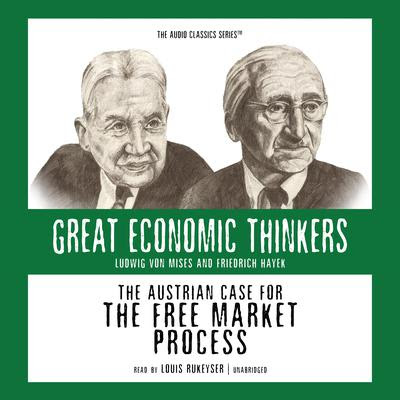So I recently finished listening to an economics audiobook about Ludwig von Mises and Friedrich von Hayek. It was called “The Austrian Case for the Free Market Process.” This audiobook was the sequel to another audiobook called “Early Austrian Economics,” which I first listened to some years ago. One might have titled this audiobook “Later Austrian Economics,” except that applying the term “later” to this will no doubt be outdated before too long, if it isn’t already. Besides, “The Austrian Case for the Free Market Process” is probably a more exciting title, and may do more justice to the nature of the subject matter.
Like the earlier audiobook, this audiobook was focused on the Austrian School of economic thought. But unlike the other audiobook, it was focused on just two economists from that school. Again, these were Ludwig von Mises and Friedrich von Hayek. They were longtime friends with each other, so it makes sense to cover them together. After the Nazis occupied Austria, Mises actually escaped from Nazi rule by emigrating to the United States in 1940. In a similar way, Hayek emigrated to Great Britain in 1938, where he could teach and publish more freely.
Adam Smith, who influenced the Austrian School
Ludwig von Mises lived from 1881 to 1973. He was an interdisciplinary thinker – who wrote on logic, history, and sociology as well as economics. He was opposed to most economic interventions, and would probably be described as a libertarian today. Ironically, he was an advocate of classical liberalism, the philosophy of freedom advocated by people like Adam Smith. But the word “liberalism” has acquired a somewhat different meaning today, which is inappropriate to describe someone like Ludwig von Mises, who is more of a libertarian. I found myself in agreement with most of what he said.
Ludwig von Mises
Friedrich August von Hayek lived from 1899 to 1992. Thus, he was still living when this audiobook first came out in 1988, and did not die until about four years later. He was also an interdisciplinary thinker, who is known as much for his social and political philosophy as he is for his economic work. He won the Nobel Memorial Prize in Economic Sciences in 1974, better known as the “Nobel Prize for Economics.” But when he was awarded this prize, his acceptance speech said that he was opposed to the existence of the prize. Mainly, this was because of his belief that it conferred a false degree of authority upon those who obtained this prize. He believed that if the committee continued to award the prize in future years, it should start to require a vow of humility from those who won it, acknowledging that they were not the “superhuman” sources of authority that some of them thought themselves to be.
Friedrich August von Hayek
Hayek was the first free-market (non-Keynesian) economist to win this prize, which had only been created five years before in 1969. Like his teacher Ludwig von Mises, he was opposed to most government interventions. When Hayek spoke of attempts at the “central planning” of an economy, he said that aspiring central planners should be more humble about the knowledge that they really have. He believed that no one possessed the degree of wisdom and information to engage in successful central planning of an economy – thus echoing an Adam Smith quote before him. He was also dubious about the scientific validity of macroeconomics in general – and particularly that of his chief rival, John Maynard Keynes.
John Maynard Keynes, the chief rival of this generation of the Austrian School
By now, you can probably see why I like the Austrian School so much. It is a great school of thought, and I enjoyed hearing about it in both of these audiobooks. I liked hearing both the “Early Austrian Economics” and the later Austrian economics covered in “The Austrian Case for the Free Market Process.” I would recommend either of these audiobooks to people interested in the history of economic thought, and would recommend the ideas of the Austrian School for anyone seeking truth about economics.
See also:
Part of the audiobook series
Great Economic Thinkers
The Austrian Case for the Free Market Process
See also the audiobook series
Secrets of the Great Investors
Others to be covered later
See also the audiobook series
The Giants of Political Thought
Others to be covered later








No comments:
Post a Comment